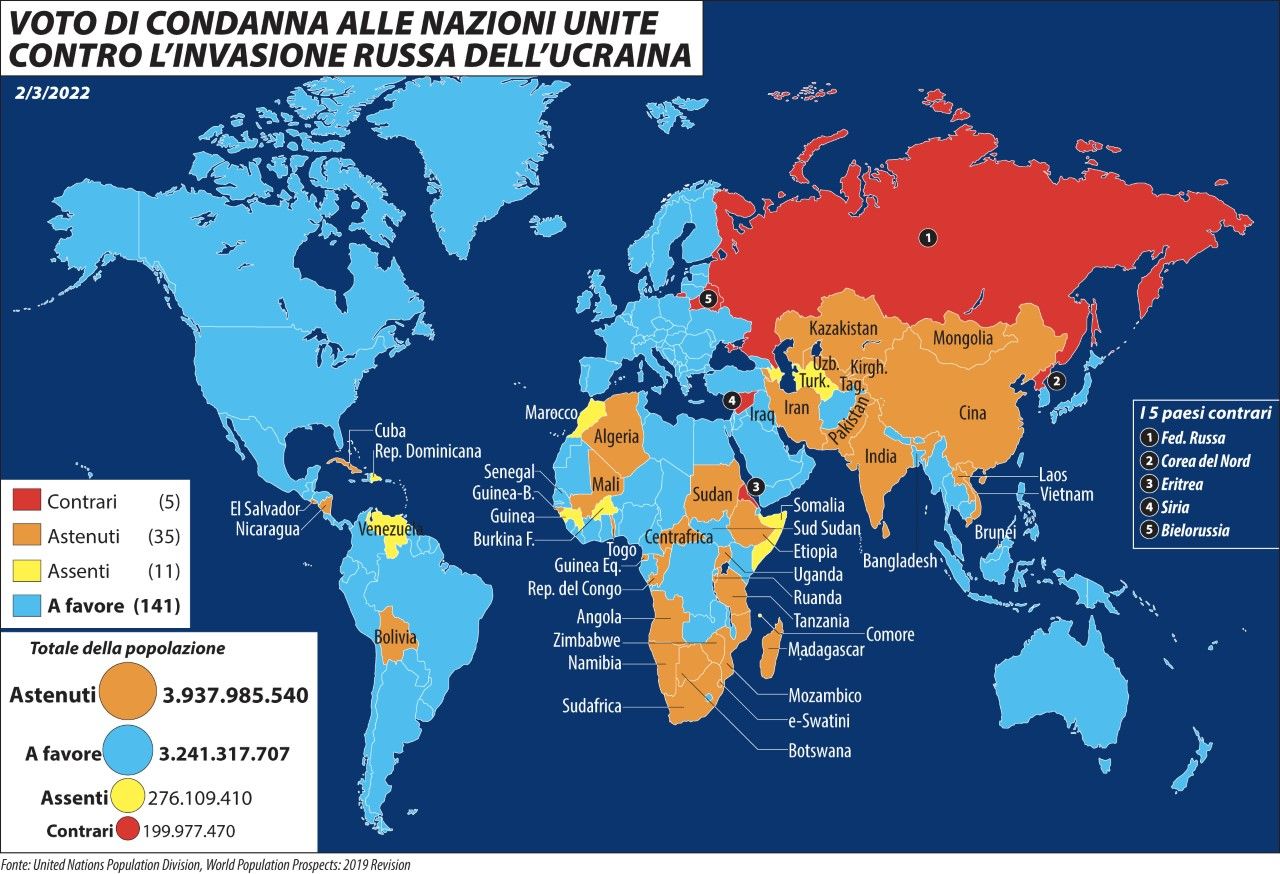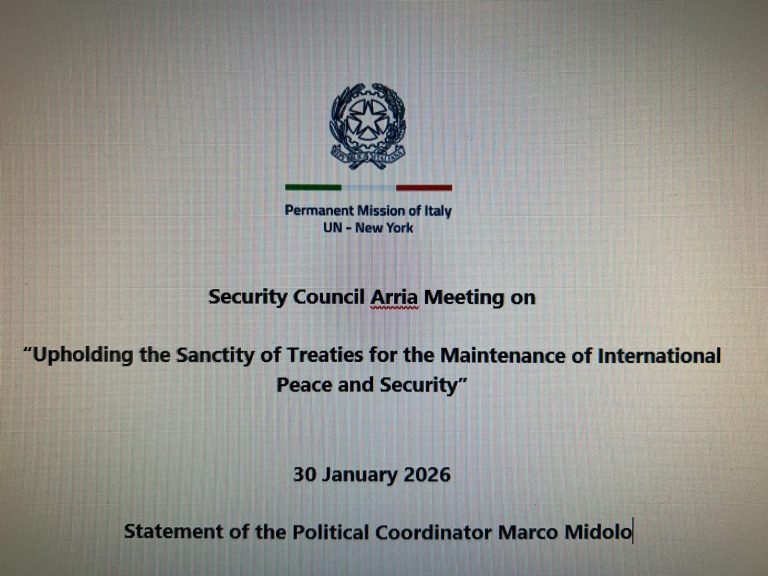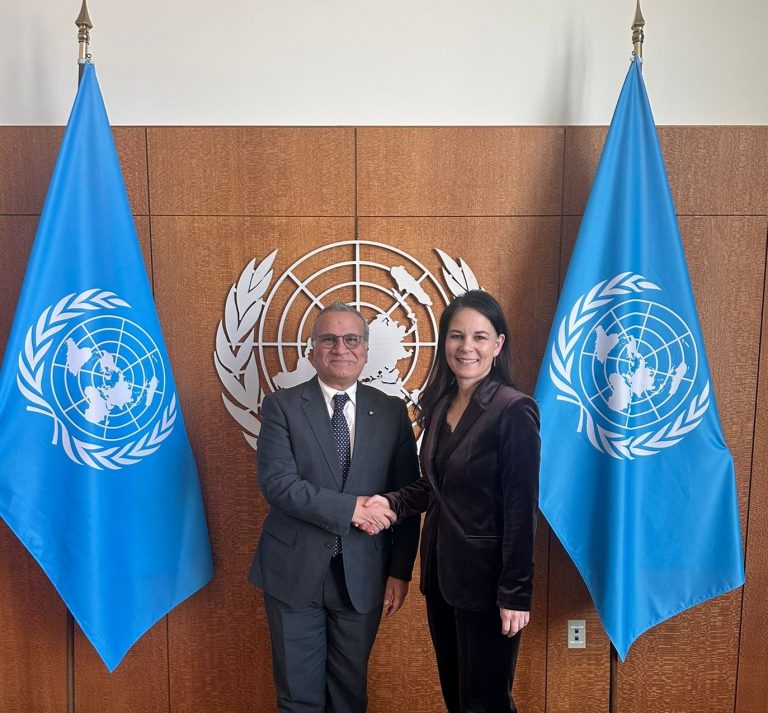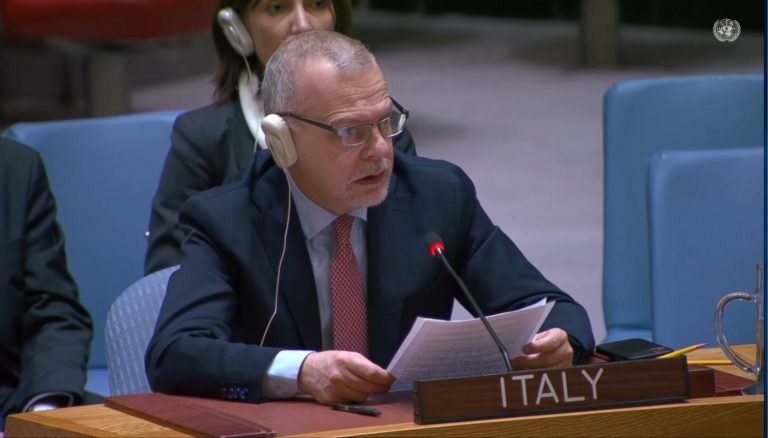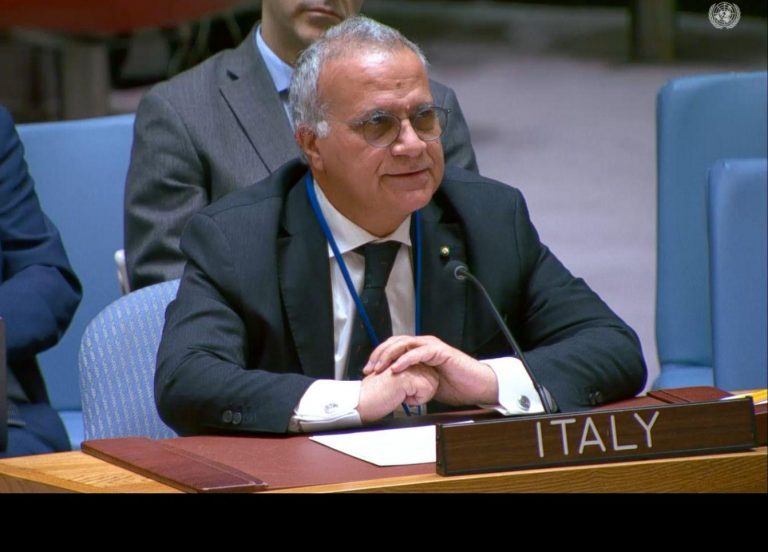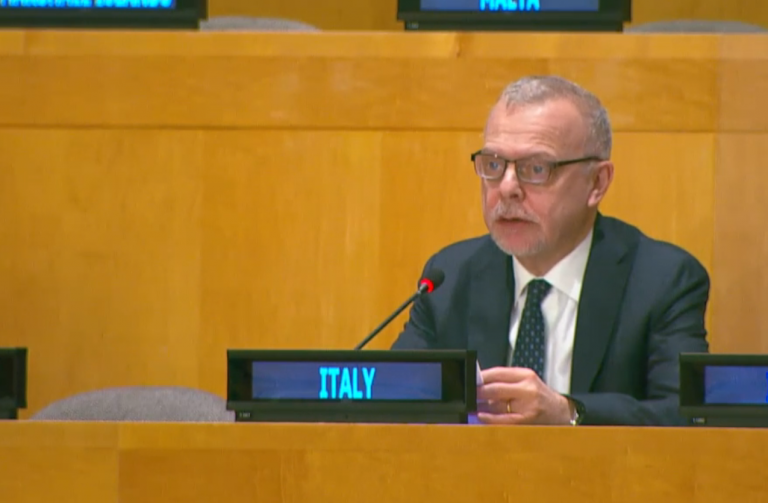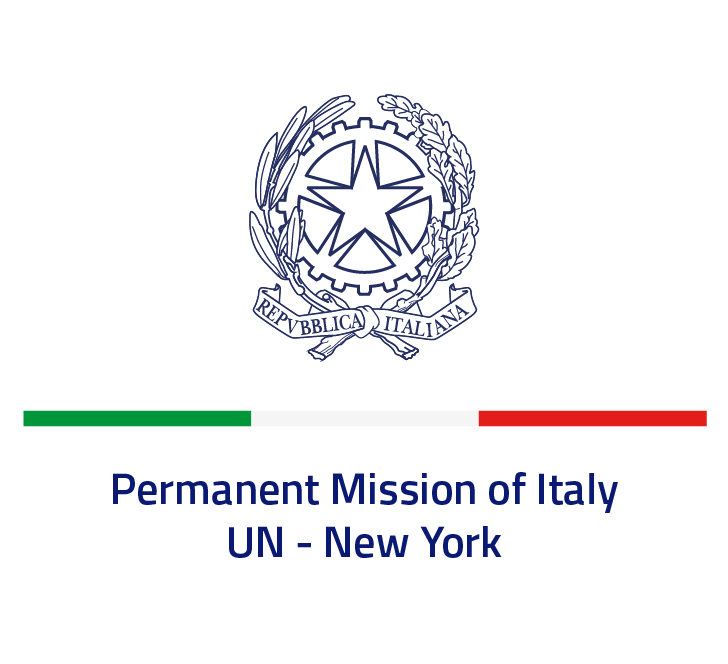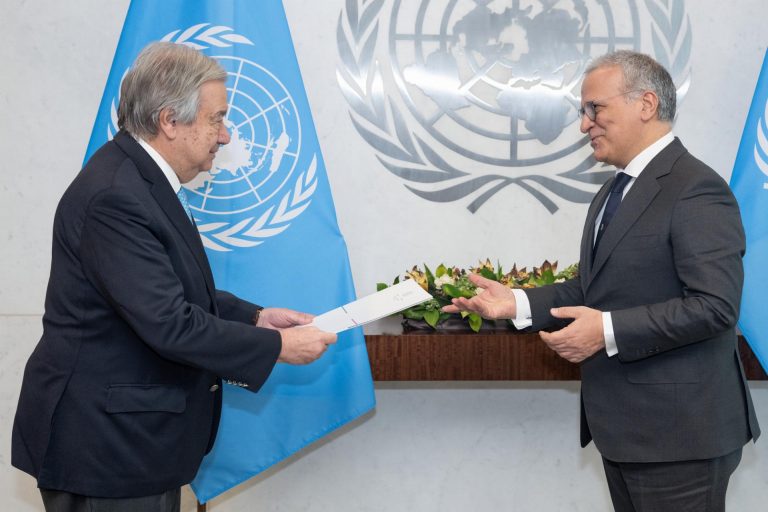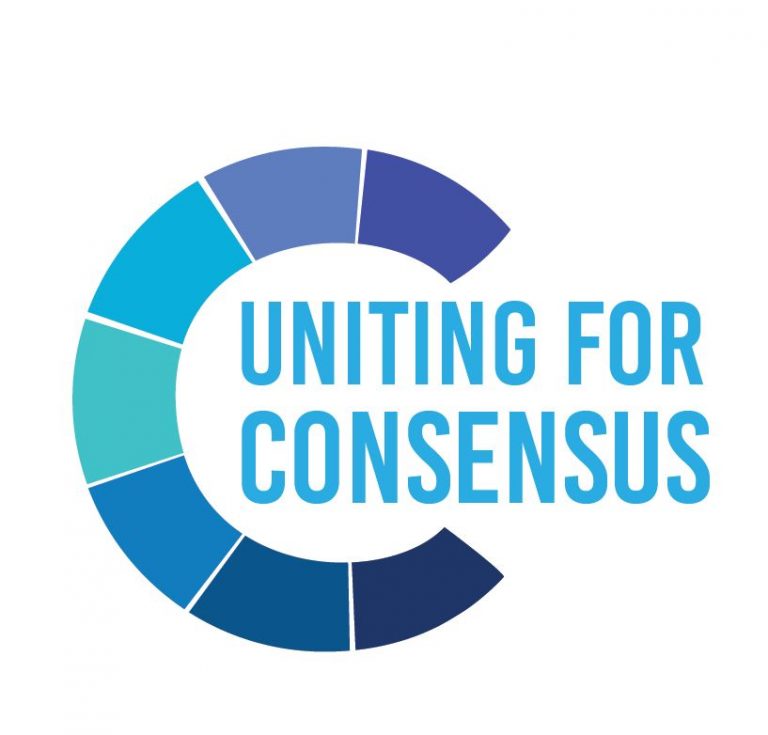Conversation with Ambassador Maurizio Massari, Permanent Representative of Italy to the UN.
edited by Lucio Caracciolo
LIMES With the Ukraine war, has a new divide emerged between the canonical West and the rest of the world within the United Nations?
MASSARI The ongoing conflict has complicated the relationship between the West and the global South. Due to the substantial paralysis of the Security Council, the General Assembly has adopted several resolutions so far. Three of these have passed overwhelmingly (more than 140 votes in favor) due to the clear violation of the UN Charter regarding territorial integrity, defense of sovereignty and independence of states. The first deplores Moscow’s military action against Kiev, the second calls for the facilitation of U.N. humanitarian intervention in Ukrainian territory, and the third condemns the sham referenda on Russia’s annexation of four Ukrainian regions.
This large majority, however, does not eliminate the sharp divisions and different sensitivities over the war. For example, when voting to suspend Russia from the Human Rights Council or to open a war damage registry, the number in favor dropped (only 93). The countries of the Global South do not want potentially dangerous precedents to be set should they themselves find themselves in critical situations.
Unlike the West, which sees this as the main conflict of our historical moment, the Global South sees it as only one of many and fears above all its economic, social and energy repercussions. These countries are therefore calling for strong diplomatic action to end the war, which is why the Assembly included a paragraph in the resolution on the sham referenda stressing precisely the need for such a resolution.
Separately, latent resentment in this part of the world imputes the West’s use of double standards on conflicts and rights violations. As of Feb. 24th, Western countries are also blamed for being distracted from engaging on more pressing issues for the rest of the countries, such as the climate emergency, food security and national debt.
LIMES The Security Council stalemate exposes the UN’s inability to intervene in this war. Is the organization up to the times or does it need to be changed?
MASSARI The Council’s deadlock on the Ukrainian issue was a foregone conclusion because one of the permanent members with veto power, Russia, is a party to the conflict. Yet in recent months the five permanent members have nonetheless adopted important resolutions, such as renewing the mandates of almost all peacekeeping missions.
Moscow approved the renewal of the mission in Libya for one year and not for six months as was previously the case. This was because the Secretary-General’s Special Adviser for Libya, the American Stephanie Williams, who was disliked by the Russians, terminated her post and was replaced by Senegalese Abdoulaye Bathily. It was also thought that Moscow would oppose the renewal of the European-led mission in Bosnia, “Althea.” Instead, it gave the go-ahead partly to avoid the possibility that a non-reappointment might prelude direct NATO involvement. The mission on countering piracy in the Gulf of Guinea, which had not been renewed for ten years, was also approved in late November.
For the Russians, the Security Council embodies the ultimate concert of powers. If it ceased to function, Moscow would see its conception of global governance, understood as the management of international affairs, negated. Its interest in keeping it operational is therefore obvious. That said, something must change. The debate on Council reform has been rekindled with greater intensity, especially as countries such as India, Brazil and those in Africa demand a modernization of its composition
LIMES For the five permanent members, time seems to stand still at the end of World War II.
MASSARI Yes, but not only that. The question is how to reform the composition of the Security Council and prospectively other fora such as the G20. On the latter summit, for example, hangs a request from the African Union for representation. The related issue concerns Africa itself, which has a presence in the G20 only through the seat allocated to South Africa. Although it will reach 2.5 billion people in 2030, the continent still finds itself excluded from the mechanisms of global governance.
LIMES How is China’s position on this war perceived at the United Nations?
MASSARI Especially in recent months, China has made it clear that it does not want this conflict because of the instability generated in the global economy, supply chains, decoupling, and so on. Beijing has made its unease clearer since the Samarkand Summit up until the most recent G20.
However, the People’s Republic of China has hinted that it does not consider its leverage over Russia strong enough to convince Vladimir Putin to sit at the negotiating table. The question is whether this is really a lack of leverage or rather whether the Russia-China partnership is seen by Beijing as leverage in competing with the West. Despite its limitations, the arrangement with Moscow serves Beijing at least until the terms of the rivalry with Washington are clarified. I don’t think China now has any particular interest in breaking away from its partnership with Russia.
LIMES Playing an unexpected role in this challenge is India. Has it become a big player?
MASSARI Absolutely, and it is probably not the kind of actor the West hoped it could be. New Delhi thinks of itself as a great power championing a “developmentalist” agenda for the global South based on revising the rules of the world economic order and the international financial architecture. As a non-permanent member in the Security Council, India in this two-year period has shown itself to be a distinctly sovereignist democracy, with a foreign policy that responds to its own national interest and does not necessarily adhere to Western positions. So much so that it has consistently abstained from voting on resolutions on Ukraine and does not enforce sanctions on Russia. On the contrary, it maintains relations with Russia on energy and military cooperation.
On many other issues debated in the Council, for example on Myanmar, India has sided with the Russians and Chinese, contrary to the West’s initial expectations. Moreover, as Western countries seek to introduce formal discussions in the Council on the increasingly topical climate-security nexus, India, Brazil, China, and Russia reject this link.
In parallel, India is increasingly assertively claiming a permanent seat on the Security Council by leveraging its demographic and economic weight. This is a sensitive issue because both New Delhi and Beijing are among the developing countries. Yet India will become the most populous country on the planet in the next decade and has recently become the world’s fifth-largest economic power, surpassing the United Kingdom. China is already the second in the world.
LIMES In short, we have some somewhat outdated categories.
MASSARI Yes. Although the West provides a great deal of resources to narrow the gap between the global North and South, this juxtaposition no longer corresponds to the reality of how power is taking shape.
LIMES Within the UN, what role do the BRICs play? Do they exist?
MASSARI The BRICs do not exist as a constituted group, but they exist de facto in that India, China, Russia, and Brazil often adopt a common approach on many dossiers, for example, on the climate and security issue and on the principle of non-interference in the Myanmar internal conflict. On these economic and demographic powers, there is a basic misunderstanding to clear up: countries like India and Brazil, while democracies, do not necessarily espouse Western priorities.
LIMES At what point is Italy’s historic battle to prevent Germany and Japan from joining the Security Council as permanent members?
MASSARI It is proceeding, less and less quietly. The Council’s paralysis due to the Russian-Ukrainian conflict has reinvigorated voices in favor of its reform, starting with the four countries that claim a permanent seat: Germany, Japan, Brazil, but especially India. The African countries, for their part, are also demanding two permanent seats and insisting on veto rights, based on the principle of equal status with the current five permanent members.
The main issue remains veto rights because adding more permanent members with veto rights does not solve the Council’s paralysis; on the contrary, it complicates it. The Italian proposal-supported by a large number of countries such as Canada, South Korea, Turkey, Spain, Argentina and Mexico-is not directed against any specific country. Instead, it wants to respond to the need for greater representativeness of Africa, Asia and Latin America by enlarging the Council through non-permanent seats. Thus, avoiding the creation of new privileges (i.e., more veto rights) that would further block the work of the Council. For the more ambitious countries, our idea includes the possibility of seats with a longer term, as well as re-eligibility up to even eight continuous years.
The criterion of election is the key qualifier. If a country is elected by the 193 countries of the General Assembly it will be accountable to the entire body of nations, whereas if it becomes a permanent member, it will answer only to itself. Italy hopes that the element of realism and democracy inherent in its proposal can be the landing zone for this very long debate. Not least because, let’s remember, the majority of permanent members are not willing to increase the number of permanent members of the Council with equal veto power.
LIMES Does this mean that there are those among them who are willing to enlarge it?
MASSARI France and the United Kingdom have come out openly in favor of claims on Council enlargement to include new permanent members from G4 countries. Recently, the United States has also been more supportive of the aspirations of the G4 countries and Africa to become permanent members, while hinting that it does not want to alter the current balance on veto rights. Russia and China, on the other hand, have a more selective approach, although they also differ among themselves. Overall, there is caution from all five states on the issue of giving veto rights to potential new permanent members.
Link to interview: https://www.limesonline.com/la-guerra-riaccende-la-faida-tra-sud-del-mondo-e-occidente/130295?__vfz=medium%3Dsharebar







